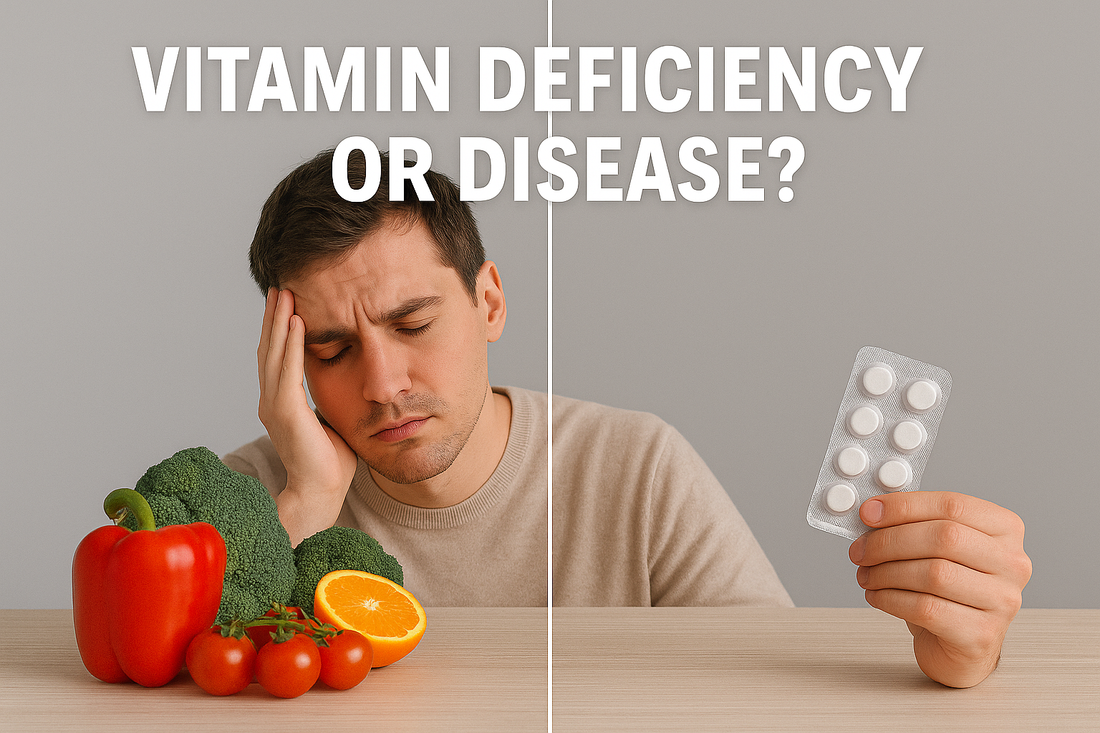
คุณป่วยหรือแค่ขาดสารอาหาร?
โภชนาการสมัยใหม่กำลังทำให้เราล้มเหลวได้อย่างไร และเราควรทำอย่างไร
คุณรู้สึกเหนื่อยตลอดเวลา ระบบย่อยอาหารของคุณก็แย่ คุณไม่สามารถจดจ่อได้เหมือนแต่ก่อน บางทีข้อต่อของคุณอาจจะเจ็บ หรือไม่ก็ป่วยง่ายเกินไป
คุณหมออาจจะบอกว่าเป็นเพราะอายุมาก หรือความเครียด หรือโชคร้าย
แต่จะเกิดอะไรขึ้นถ้าเกิดว่ามันเป็น ภาวะทุพโภชนาการ จริงๆ?
ไม่ใช่แบบที่เกิดจากความอดอยาก แต่เป็นแบบที่เกิดจากการกิน อาหารมากเกินไปจนขาดสารอาหารอย่างแท้จริง มันพบได้บ่อยกว่าที่คนส่วนใหญ่คิด และเป็นต้นตอของอาการเรื้อรังหลายอย่างที่เรารักษาด้วยยาแทนอาหาร
ข้อบกพร่องที่ซ่อนอยู่เบื้องหลังอาการในชีวิตประจำวัน
การขาดสารอาหารไม่จำเป็นต้องแสดงว่าเป็นโรคร้ายแรงเสมอไป
มักจะเริ่มต้นจากปัญหาเล็กๆ น้อยๆ ในชีวิตประจำวัน:
อาการอ่อนล้าเรื้อรัง อาจเกิดจากการขาดวิตามินบี 12 ธาตุเหล็ก หรือแมกนีเซียม
ความผิดปกติทางอารมณ์ อาจเกี่ยวข้องกับโคลีน สังกะสี หรือวิตามินดีที่ต่ำ
อาการปวดข้อ อาจเกี่ยวข้องกับการขาดโอเมก้า 3 วิตามินเค 2 หรือคอลลาเจน
ภาวะสมองล้า อาจเป็นสัญญาณของวิตามินบีรวมต่ำหรืออาการอักเสบจากอาหารแปรรูป
และเนื่องจากอาการเหล่านี้พบได้บ่อยมาก คนส่วนใหญ่จึงไม่ทราบว่าเกี่ยวข้องกับโภชนาการ แต่จริงๆ แล้วอาการเหล่านี้เกี่ยวข้อง และบ่อยครั้งก็มากกว่าที่ยาจะรักษาได้
ทำไมพวกเราหลายคนจึงขาดสารอาหาร — แม้ว่าจะอิ่มดีแล้วก็ตาม
คุณสามารถกินอาหารสามมื้อต่อวันแต่ยังคงขาดสารอาหารที่จำเป็นที่ร่างกายต้องการในการทำงาน
มีสาเหตุหลักสี่ประการดังนี้:
การหมดสิ้นของดิน
การเกษตรแบบอุตสาหกรรมได้พรากแร่ธาตุในดินของเราไป แครอทในปัจจุบันมีสารอาหารน้อยกว่าแครอทที่ปลูกเมื่อ 50 ปีก่อนมาก
อาหารแปรรูปขั้นสูง
พวกมันมีแคลอรีสูงแต่มีคุณค่าทางโภชนาการต่ำ การแปรรูปจะขจัดใยอาหาร เอนไซม์ และวิตามินที่ละเอียดอ่อนออกไป
การปลูกพืชเชิงเดี่ยวและการปรับปรุงพันธุ์สมัยใหม่
พืชสมัยใหม่หลายชนิดถูกคัดเลือกโดยพิจารณาจากขนาดและผลผลิต ไม่ใช่ปริมาณสารอาหาร รสชาติและความหนาแน่นถูกละเลยเพื่อความสม่ำเสมอและความสะดวกในการขนส่ง
ความต้องการที่เพิ่มขึ้น
ความเครียด มลภาวะ การนอนหลับไม่เพียงพอ และอาการอักเสบเรื้อรัง ล้วนทำให้ความต้องการสารอาหารของร่างกายเพิ่มขึ้น เช่นเดียวกับที่อาหารที่คุณรับประทานเข้าไปก็ทำให้คุณได้รับสารอาหารน้อยลง
สารอาหารไม่เพียงแต่ทำให้คุณอิ่มเท่านั้น แต่ ยังช่วยให้ คุณ
วิตามินและแร่ธาตุไม่ได้เป็นเพียงแค่ส่วนประกอบที่ทำหน้าที่เฉยๆ แต่ยังทำหน้าที่ส่งสัญญาณ ควบคุม และกระตุ้น กระบวนการทางชีวภาพที่สำคัญ
แมกนีเซียม กระตุ้นปฏิกิริยาเอนไซม์มากกว่า 300 ปฏิกิริยา
สังกะสี ควบคุมการตอบสนองภูมิคุ้มกันและการสมานแผล
วิตามินดี มีปฏิสัมพันธ์กับยีนมากกว่า 1,000 ยีน
สารประกอบพืชรอง เช่น ฟลาโวนอยด์และกลูโคซิโนเลต จะเปิดและปิดการอักเสบ
โคลีน เป็นสิ่งจำเป็นต่อการทำงานของสมองและการสร้างความจำ
สิ่งเหล่านี้ไม่ใช่แค่สารอาหารโบนัสเท่านั้น แต่ยังเป็นพื้นฐานของทุกระบบในร่างกาย และคุณจำเป็นต้องได้รับมัน ทุกวัน
สิ่งที่การแพทย์เชิงฟังก์ชันเข้าใจ (และการแพทย์แผนปัจจุบันไม่เข้าใจ)
แพทย์เวชศาสตร์ฟังก์ชันอย่าง ดร. มาร์ค ไฮแมน ได้ชี้ให้เห็นมานานแล้วว่าโรคเรื้อรังหลายชนิด แท้จริงแล้วเกิด จากภาวะทุพพลภาพที่เกิดจากสารอาหาร อาการอาจดูเหมือนเป็นโรค แต่สาเหตุมักง่ายกว่าและสามารถรักษาให้หายได้
แทนที่จะถามว่า "ฉันควรกินยาอะไรเพื่อรักษาอาการนี้?"
พวกเขาถามว่า "ระบบอะไรไม่สมดุล? อะไรหายไป?"
แนวทางการแก้ไขปัญหาที่ต้นเหตุนี้ช่วยให้ผู้คนสามารถย้อนกลับสภาวะต่างๆ ได้ เช่น:
ความเหนื่อยล้าและหมดไฟ
IBS และอาการท้องอืดเรื้อรัง
ไมเกรน
ภาวะซึมเศร้าและวิตกกังวล
ภาวะภูมิคุ้มกันทำลายตนเอง
และบ่อยครั้งขั้นตอนแรกไม่ใช่ยา แต่เป็น อาหารจริง
ยาสามารถทำให้อาการขาดยาแย่ลงได้อย่างไร
เมื่อไม่มีการสังเกตเห็นความบกพร่อง มักจะนำไปสู่การต้องใช้ยา
แต่ปัญหาอยู่ที่ตรงนี้:
ยาหลายชนิด ทำให้สารอาหารที่จำเป็นหมดไป
ตัวอย่างเช่น:
ยาบล็อกกรดช่วยลดการดูดซึมวิตามินบี 12 ธาตุเหล็ก และแมกนีเซียม
ยาขับปัสสาวะจะขับโพแทสเซียม โซเดียม และแมกนีเซียมออกไป
ยาต้านอาการซึมเศร้าอาจส่งผลต่อวิตามินบี 6 และโคคิวเทน
สแตตินรบกวนการผลิต CoQ10 ซึ่งมีความสำคัญต่อสุขภาพหัวใจ
ยาจึงทำให้เกิดอาการใหม่…และมีการเพิ่มยาใหม่ๆ เข้ามา
นี่คือ วงจรอันโหดร้ายของผลข้างเคียงของยา ในขณะที่ปัญหาเดิมอาจแก้ไขได้ด้วยการตอบสนองความต้องการทางโภชนาการขั้นพื้นฐาน
ไมโตคอนเดรีย ไมโครไบโอม และการแสดงออกของยีน — ทั้งหมดขึ้นอยู่กับสิ่งที่คุณกิน
ร่างกายของคุณไม่ได้ทำงานด้วยอาหารเพียงอย่างเดียว แต่ ถูกสร้าง จากอาหารด้วย
ไมโตคอนเดรีย ซึ่งเป็นโรงงานผลิตพลังงานขนาดเล็กในเซลล์ของคุณต้องการสารอาหาร เช่น แมกนีเซียม วิตามินบี และ CoQ10 เพื่อทำงาน
จุลินทรีย์ในลำไส้ของคุณขึ้นอยู่กับเส้นใยพืช โพลีฟีนอล และอาหารหมัก ไม่ใช่สารเติมแต่งและน้ำตาล
ยีนที่ควบคุมการอักเสบ การล้างพิษ และการรักษาจะถูกกระตุ้นหรือถูกปิดใช้งานโดยสารประกอบในอาหารของคุณ
สั้นๆ ก็คือ:
สิ่งที่คุณกินจะบ่งบอกร่างกายของคุณว่าต้องทำอะไร
อาหารจริงคือทางออก — และไม่จำเป็นต้องซับซ้อน
ข่าวดีก็คือคุณไม่จำเป็นต้องกินซูเปอร์ฟู้ดแปลกใหม่หรืออาหารเสริมราคาแพง คุณต้องการ อาหารจริง ที่:
ปลูกในดินที่มีชีวิตและอุดมไปด้วยแร่ธาตุ
ปราศจากสารพิษที่ขัดขวางการดูดซึมสารอาหาร
จัดส่งแบบสดและรับประทานได้ใกล้เคียงกับสภาพธรรมชาติ
ซึ่งหมายถึงผักท้องถิ่น ปลาที่จับได้ในธรรมชาติ ไข่ไก่ที่เลี้ยงปล่อย อาหารหมักดอง เมล็ดพืช สมุนไพร รากไม้ และผลไม้ ไม่ใช่ผลิตภัณฑ์ที่มีรายการส่วนผสมยาวเกินกว่าหนึ่งย่อหน้า
บทสรุป: คุณไม่ได้พัง — คุณแค่พลาดสิ่งที่สำคัญไป
คนส่วนใหญ่ไม่จำเป็นต้องใช้ยาเพิ่ม
พวกเขาต้องการอาหารที่เหมาะสมมากขึ้น — อาหารจริงที่บำรุง รักษา และฟื้นฟูความสมดุล
เพราะในกรณีส่วนใหญ่คุณไม่จำเป็นต้องมีใบสั่งยา
คุณเพียงแค่ต้องเปลี่ยนอาหารของคุณให้เป็นยา
